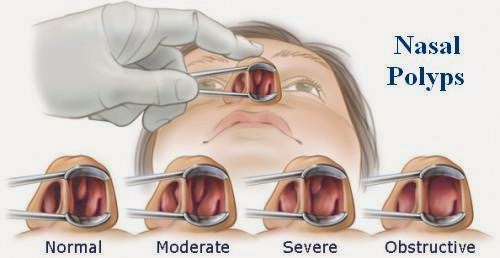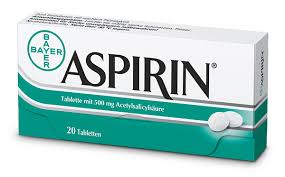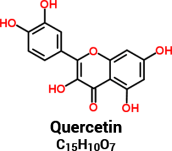Nasal polyps are non-cancerous growths the can develop in the nose or deeper into the sinuses. They are shaped like a teardrop, and are soft jelly-like in texture. Nasal polyps can range from small un-noticeable growths to large lumps which cause pain, swelling and embarrassment, as large ones can be visible to others. Most people who have polyps on one side will eventually get them on the other side too.

It is estimated that about 6 to 7% of the adult population suffers from nasal polyps, and this condition appears to be more common in the middle aged and among males. Persons with asthma and other allergies are more prone to develop nasal polyps, as are children with cystic fibrosis.
Symptoms of Nasal Polyps
Some people, especially those with smaller nasal polyps or polyps deep inside the sinuses, may never realise they have them. The most common symptoms are those of a typical cold, and many people may disregard them as such. However, unlike a typical cold, the symptoms due to nasal polyps will be persistent and never seem to get better. If you have a permanent runny or blocked nose, there’s a good chance you have nasal polyps.
Another common symptom is loss of smell and a poor sense of taste. You may also experience the feeling of mucus running down at the back of your throat. As the polyps grow larger, you may get facial pain and swelling and you may develop a persistent headache. As the growth obstruct the nostrils, you will start finding yourself breathing from your mouth and you will likely start snoring at night.
Who Is at Risk of Nasal Polyps?
 Anyone may develop nasal polyps, but some groups of the population will be particularly at risk. If you have asthma or other allergies, you will be more likely to develop nasal polyps, as allergies will irritate the nasal passages and cause chronic inflammation of the nasal linings. Similarly, if you are sensitive to aspirin, you are more at risk of nasal polyps.
Anyone may develop nasal polyps, but some groups of the population will be particularly at risk. If you have asthma or other allergies, you will be more likely to develop nasal polyps, as allergies will irritate the nasal passages and cause chronic inflammation of the nasal linings. Similarly, if you are sensitive to aspirin, you are more at risk of nasal polyps.
Many children with cystic fibrosis will develop nasal polyps, a condition that upsets the body’s sodium balance, resulting in too little sodium on the outside of cells. As a result of this, body linings become covered with mucus, and this tend to cause infections of the respiratory tract.
In addition, males over 40 tend to be particularly susceptible to nasal polyps. There is also a genetic component, meaning that if your parents had them, you are more likely to suffer from them.
Causes of Nasal Polyps
The exact cause of nasal polyps is unknown and the step by step mechanism leading to their development has not been elucidated yet. However, it is known that some conditions and situations (mentioned above) increase their likelihood. It is also known that the polyps are a result of inflammation of the nasal linings and sinuses – in other words, if there is no inflammation, growth of the polyps is not possible. Inflammation is required for nasal polyps to occur. This inflammation causes an accumulation of fluids in the area, and eventually the swollen epithelial cells are pulled down by gravity, leading to the characteristic tear-drop growths – nasal polyps.
Diagnosis of Nasal Polyps
A doctor will make a diagnosis based on a clinical examination and history of symptoms. Tests which may be carried out include a nasal endoscopy, a CT scan, and skin prick allergy test to check for allergies, and a test for cystic fibrosis (if the patient is a young child).
Nasal Polyps Treatment
Conventional treatment for nasal polyps involves either steroids or surgery. Steroids may be given as a spray, nose drops, or steroid tablets. Sprays and nose drops will reduce the inflammation and shrink the polyps, and are generally used for small polyps. Steroid sprays and drops will produce improvement in about a week, however, once treatment is stopped, the polyps quickly regain their original size and often grow bigger. Unfortunately, steroid sprays and drops cannot be used forever, as side effects such as chronic headaches, nosebleeds and sore throats quickly develop.
For larger polyps, steroids tablets will be prescribed, often in combination with steroid spray. However, steroid tablets cause weight gain and cannot be take for more than a few weeks; after which polyps re-growth quickly occurs.
The other option is surgical removal of the polyps. There are two types of surgery – polypectomy and endoscopic sinus surgery. The former involves cutting the polyps through the nostril, and sometimes some bone will be removed from the nose to reduce the risk of re-growth. On the other hand, endoscopic sinus surgery requires cuts to be made on the face, and entering the sinuses through these cuts. This type of surgery is used for larger polyps. Cost of surgery in the USA is between $2,000 to $15,000, depending on size and location of the nasal polyps, surgeon, and hospital.
Unfortunately, even surgery is not a permanent option and about 75% of surgery patients will experience nasal polyps again shortly after recovering from the procedure. It is not uncommon for the polyps to grow larger than their original size.
Is there No Permanent Cure?
Steroids and surgery are not a permanent cure. However, there is hope. The secret lies not in how to shrink the polyps, but how to stay nasal polyps free forever. This involves re-programming the body. Basically, the exact cause of nasal polyps is unknown, but it is known for sure that for nose polyps to grow, there needs to be an inflammation of the nasal linings.
Hence, if you can make sure there is no inflammation, you will get no polyps growth. To avoid inflammation, you need to make sure you manage properly your asthma and other allergies, ensure proper nasal hygiene and make sure the air in your home is not too dry; if it is, get a humidifier.

In addition, to keep your body in an anti-inflammatory state, you need to limit foods which cause the production of inflammatory substances (such as concentrated sources of omega 6 fatty acids and saturated fat) and increase your intake of foods which combat inflammation and which help your body produce anti-inflammatory molecules (such as quercetin anti-oxidants and omega 3 fatty acids).
Now, back to shrinking the nasal polyps in the first place. You do not need to resort to surgery or steroids. In fact, you should NOT use steroids as these will cause your polyps to become resistant and harder to remove once steroid therapy is stopped.
You can get rid of nasal polyps quickly and safely using herbal extracts and mixtures which you can apply to the nose or heat and inhale the vapour. These will bring the inflammation down and shrink the polyps in as quickly as a few days, depending on the size of the polyps and the severity of inflammation.
The process of shrinking the nasal polyps can be hastened by adding vitamin and mineral supplements to your diet. For example, Vitamin E is crucial for healthy cell linings while Vitamin C is a potent anti-oxidant. In addition, you should change your diet to include more anti-inflammatory foods and avoid foods which can cause inflammation. This will not only speed up the shrinkage of the polyps, but will also improve your overall health.
For a complete guide on how to get rid of nasal polyps naturally, safely, and rapidly, check out Nasal Polyps Treatment Miracle™ – The Natural Nasal Polyps Cure

I am Grace from Kenya I have been suffering from nasal polyps I don’t know how to end it . my dad refuses treatments except from steroids plz help me
LikeLike